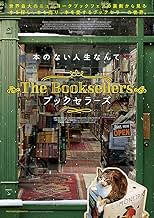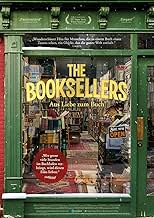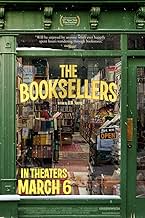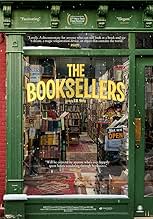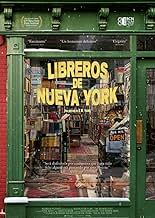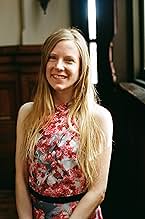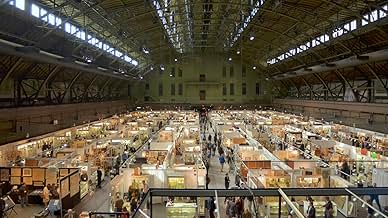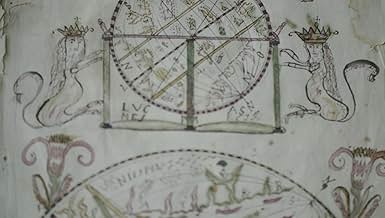The Booksellers
- 2019
- 1h 39m
IMDb RATING
6.9/10
2.3K
YOUR RATING
A behind-the-scenes look at the New York rare book world.A behind-the-scenes look at the New York rare book world.A behind-the-scenes look at the New York rare book world.
Parker Posey
- Self
- (voice)
Featured reviews
The number of films which feature rare book trading you could probably count on your fingers. One of the few is "The Ninth Gate" (loosely based on "Club Dumas" by Perez-Reverte) with Johnny Depp, an antiquarian book scout who's on the sleazier end of the spectrum. (He uses the old "high ball/low ball trick" to acquire an important antiquarian edition of "Don Quixote" printed in 1780.) Another is "84 Charing Cross Road". A few rare and antiquarian booksellers appear at the beginning of a few fantasy films, such "The Neverending Story", often as rather cantankerous older eccentrics in tweed jackets and droopy plaid bow-ties. (I wish the plaid bow-tie would be put out of its misery.)
"The Booksellers" offers a more nuanced perspective featuring those trading in antiquarian, rare and collectible books. Most of the booksellers given airtime have been in the trade a long time but there are a fair number of relatively young newcomers who are also given screen-time. (The age of 40 is regarded as "young" in the trade.) It also chronicles a bit about the history of collectible and antiquarian book trading and even a segment about the dynamics of auctions. (Often films having an auction scene are nearly exclusively fine art.)
I am an antiquarian book collector myself (mostly books printed circa 1500 to 1700), and I've bought a few items from some of the booksellers profiled. It is interesting that during the 20th century, there were dozens and in some cases 100's of used bookstores in urban areas. Books have been an important part of many people's lives. And yet for elusive reasons, the world of books gets sparse media attention, be it films, television, and even books about books. Book collectors I think tend to be under the radar. Until I joined the Book Club of California, I knew almost no book collectors.
Several of the people highlighted: Rebecca Romney, whose sort of the closest equivalent to a movie star in the antiquarian book world (if there is such a thing), in large part because of her book appraisals on the History Channel's "Pawn Stars"; David Bergman, a pretty down-to-earth mid-level NY antiquarian bookseller who specializes in large antiquarian with prints and engravings; and Henry Wessells of James Cummins, bookseller. Nicholas Lowry, who many PBS viewers will recognize because of his appraisals of vintage posters on the Antiques Roadshow US, offers compelling commentary on the history of book collecting. So does Stephen Massey, also a regular on the Antiques Roadshow US. One of Massey's claims to fame was being the auctioneer at the sale of Leonardo da Vinci's notebook. Winning bidder: Bill Gates of Microsoft fame. Massey also authenticated a copy of the Shakespeare First Folio which had been stolen from Durham University, Britain, in the 1990's.
One thing I appreciated about the documentary is a few book collectors and curators were interviewed. Often, material concerning the antiquarian and collectible book trade focuses only on the sellers. There wouldn't be sellers if there were no collectors! Michael Zinman, collector of early-printed books in America receives ample treatment and several booksellers comment on his focus. I also enjoyed Kevin Young, poet and curator, talking about material written and published during the Harlem Renaissance.
Two recurring themes of the documentary: that the antiquarian book traders are aging (both among dealers and collectors) and how the internet has in a lot of ways changed in some cases stifled old business models. From a collector's perspective, the internet has made collecting much easier. Simultaneously I can see how it radically forced booksellers to alter a modus operandi which worked for nearly two centuries. A first edition from 1975 which might have easily sold for $250 in 1995, if only because it wasn't easy to find a copy locally, is now competing with copies on the internet which might be priced at say $50.
I think the antiquarian booksellers need to find new and exciting ways to tap potential customers and future collectors. I'm actually a renaissance faire participant and I exhibit books printed in the 1500s to early 1600's. It's interesting how few people know that these books are bought and sold routinely. At renaissance faire, when exhibiting a Geneva Bible from 1589, it is not uncommon for people to say "How did you get this?" The answer: "I bought it from a bookseller!"
"The Booksellers" offers a more nuanced perspective featuring those trading in antiquarian, rare and collectible books. Most of the booksellers given airtime have been in the trade a long time but there are a fair number of relatively young newcomers who are also given screen-time. (The age of 40 is regarded as "young" in the trade.) It also chronicles a bit about the history of collectible and antiquarian book trading and even a segment about the dynamics of auctions. (Often films having an auction scene are nearly exclusively fine art.)
I am an antiquarian book collector myself (mostly books printed circa 1500 to 1700), and I've bought a few items from some of the booksellers profiled. It is interesting that during the 20th century, there were dozens and in some cases 100's of used bookstores in urban areas. Books have been an important part of many people's lives. And yet for elusive reasons, the world of books gets sparse media attention, be it films, television, and even books about books. Book collectors I think tend to be under the radar. Until I joined the Book Club of California, I knew almost no book collectors.
Several of the people highlighted: Rebecca Romney, whose sort of the closest equivalent to a movie star in the antiquarian book world (if there is such a thing), in large part because of her book appraisals on the History Channel's "Pawn Stars"; David Bergman, a pretty down-to-earth mid-level NY antiquarian bookseller who specializes in large antiquarian with prints and engravings; and Henry Wessells of James Cummins, bookseller. Nicholas Lowry, who many PBS viewers will recognize because of his appraisals of vintage posters on the Antiques Roadshow US, offers compelling commentary on the history of book collecting. So does Stephen Massey, also a regular on the Antiques Roadshow US. One of Massey's claims to fame was being the auctioneer at the sale of Leonardo da Vinci's notebook. Winning bidder: Bill Gates of Microsoft fame. Massey also authenticated a copy of the Shakespeare First Folio which had been stolen from Durham University, Britain, in the 1990's.
One thing I appreciated about the documentary is a few book collectors and curators were interviewed. Often, material concerning the antiquarian and collectible book trade focuses only on the sellers. There wouldn't be sellers if there were no collectors! Michael Zinman, collector of early-printed books in America receives ample treatment and several booksellers comment on his focus. I also enjoyed Kevin Young, poet and curator, talking about material written and published during the Harlem Renaissance.
Two recurring themes of the documentary: that the antiquarian book traders are aging (both among dealers and collectors) and how the internet has in a lot of ways changed in some cases stifled old business models. From a collector's perspective, the internet has made collecting much easier. Simultaneously I can see how it radically forced booksellers to alter a modus operandi which worked for nearly two centuries. A first edition from 1975 which might have easily sold for $250 in 1995, if only because it wasn't easy to find a copy locally, is now competing with copies on the internet which might be priced at say $50.
I think the antiquarian booksellers need to find new and exciting ways to tap potential customers and future collectors. I'm actually a renaissance faire participant and I exhibit books printed in the 1500s to early 1600's. It's interesting how few people know that these books are bought and sold routinely. At renaissance faire, when exhibiting a Geneva Bible from 1589, it is not uncommon for people to say "How did you get this?" The answer: "I bought it from a bookseller!"
What Truman Capote did for non-fiction - imposing a narrative tone and form on works that had mostly been a recording of facts - films like "Hoop Dreams," or "The Devil and Daniel Johnston" or "Grizzly Man," did for documentaries; i.e., they raised the bar and imposed a narrative structure on the material.
Unfortunately, as fascinating as the world of rare book dealers may be, The Booksellers seemed disorganized, often confusing without any real narrative thread. While people may recognize Gay Talese or Fran Leibowitz, people are often interviewed with no caption telling us who they are, what their job title is, and these people were, for the most part, not very interesting. The profession might attract unusual people, but the film doesn't have the "Herzog" - that skill at highlighting those idiosyncrasies in the subjects that make a documentary especially watchable.
The Booksellers (2019) -
This documentary was that sort of crass that you get from America sometimes, full of some very eccentric people, not all from the U. S. However the content still had an appeal about it by the time I made it to the end.
Some of the "Booksellers" looked incredibly familiar, but I couldn't for the life of me work out where I might have known them from, because I've never seen anything else about these people, which lead me to wonder if they might be actors, although IMDB did not back up that theory of course. Perhaps they just have those faces.
The film itself made me wish that the charming old book shops, that so many of the people described, still existed. I remembered the second hand book shop that I used to frequent, which was never going to really succeed, because the guy that owned and ran it spent all day reading instead of stacking or shelving the books in to any sort of orderly system, but it was a place to find treasures and I pray that places like it (Maybe slightly better) might come back in to fashion again.
What I liked about this documentary was that it covered diversity within writing, without screaming about it too much. There were references to authors of colour and of course those within the LGBTQ+ community, because books were a large part of bringing acceptance about and another way to access information on other cultures through stories and so on.
What worried me by the end though was the question of what happens if the internet crashes and all is lost? I don't care how many back ups the world thinks it has, we must keep books alive. Even if they're all just kept in a damp proof and fireproof building to be referred to at special request, because knowledge is so important and so is the art of writing fiction or otherwise. You wouldn't scan Van Gogh's 'Sunflowers' in to a computer and then consider it less important to keep the originals, because it's saved forever in the electric ether!
As a writer, I feel that the internet and access to the written word that way is very important, but I will always put my books out as hard copies, because I believe that there is still something important about having that book to hold and treasure if you do find that you enjoy it. You never know when Netflix will take your favourite show off of their listings and you never know when Kindle might decide that a book isn't worth keeping anymore either. If you have a real copy then you can never be without your favourite adventures or pages of knowledge.
So, overall it was interesting to see how these people worked within the industry, although for some of them it was more about the possession of a book with monetary value and less about the beauty of the words or pictures inside, but in general this film just stirred feelings within me around the creation, publication and continuation of the printed word.
600.17/1000.
This documentary was that sort of crass that you get from America sometimes, full of some very eccentric people, not all from the U. S. However the content still had an appeal about it by the time I made it to the end.
Some of the "Booksellers" looked incredibly familiar, but I couldn't for the life of me work out where I might have known them from, because I've never seen anything else about these people, which lead me to wonder if they might be actors, although IMDB did not back up that theory of course. Perhaps they just have those faces.
The film itself made me wish that the charming old book shops, that so many of the people described, still existed. I remembered the second hand book shop that I used to frequent, which was never going to really succeed, because the guy that owned and ran it spent all day reading instead of stacking or shelving the books in to any sort of orderly system, but it was a place to find treasures and I pray that places like it (Maybe slightly better) might come back in to fashion again.
What I liked about this documentary was that it covered diversity within writing, without screaming about it too much. There were references to authors of colour and of course those within the LGBTQ+ community, because books were a large part of bringing acceptance about and another way to access information on other cultures through stories and so on.
What worried me by the end though was the question of what happens if the internet crashes and all is lost? I don't care how many back ups the world thinks it has, we must keep books alive. Even if they're all just kept in a damp proof and fireproof building to be referred to at special request, because knowledge is so important and so is the art of writing fiction or otherwise. You wouldn't scan Van Gogh's 'Sunflowers' in to a computer and then consider it less important to keep the originals, because it's saved forever in the electric ether!
As a writer, I feel that the internet and access to the written word that way is very important, but I will always put my books out as hard copies, because I believe that there is still something important about having that book to hold and treasure if you do find that you enjoy it. You never know when Netflix will take your favourite show off of their listings and you never know when Kindle might decide that a book isn't worth keeping anymore either. If you have a real copy then you can never be without your favourite adventures or pages of knowledge.
So, overall it was interesting to see how these people worked within the industry, although for some of them it was more about the possession of a book with monetary value and less about the beauty of the words or pictures inside, but in general this film just stirred feelings within me around the creation, publication and continuation of the printed word.
600.17/1000.
One if these documentaries that can be quite fascinating one moment then quite dull the next. So, for me, a mixed bag here.
Gives an inside look at the seldom seen world of antique booksellers and collectors in NYC.. The film also offers a little more optimism about the field being carried on by out younger generation, although the modalities will be most different.
For those viewers that can get through the, at tines, stodginess, the doc does offer some good rewards.
Gives an inside look at the seldom seen world of antique booksellers and collectors in NYC.. The film also offers a little more optimism about the field being carried on by out younger generation, although the modalities will be most different.
For those viewers that can get through the, at tines, stodginess, the doc does offer some good rewards.
I chanced upon this documentary on Amazon Prime. Because I have quite a large collection of books and have spent much of my life haunting used bookstores, I was intrigued. It was fun to see the passion for the items themselves. All collectors have a bit of an unhealthy connection to whatever they are collecting. But why is the question that is most important. Here we see people who have connections going back generations or those who are contemporary. I enjoyed it, but I have to say that at times it really dragged. Sometimes people can be too philosophical. Still, many questions that have evaded me were answered reasonably well.
Did you know
- Quotes
Fran Lebowitz: You know what they used to call independent bookstores? Bookstores. All bookstores were independent.
- Crazy creditsIn a short closing video segment, Fran Leibowitz describes what happened when she loaned a book to David Bowie.
- ConnectionsFeatures Boudu sauvé des eaux (1932)
- SoundtracksFilm Bop
Written by David Ullmann
Performed by Jp Schlegelmilch, Vincent Sperrazza, Kevin Sun, David Ullmann & Gary Wang
- How long is The Booksellers?Powered by Alexa
Details
Box office
- Gross US & Canada
- $25,694
- Opening weekend US & Canada
- $15,794
- Mar 8, 2020
- Gross worldwide
- $177,306
- Runtime
- 1h 39m(99 min)
- Color
- Aspect ratio
- 1.78 : 1 / (high definition)
Contribute to this page
Suggest an edit or add missing content



